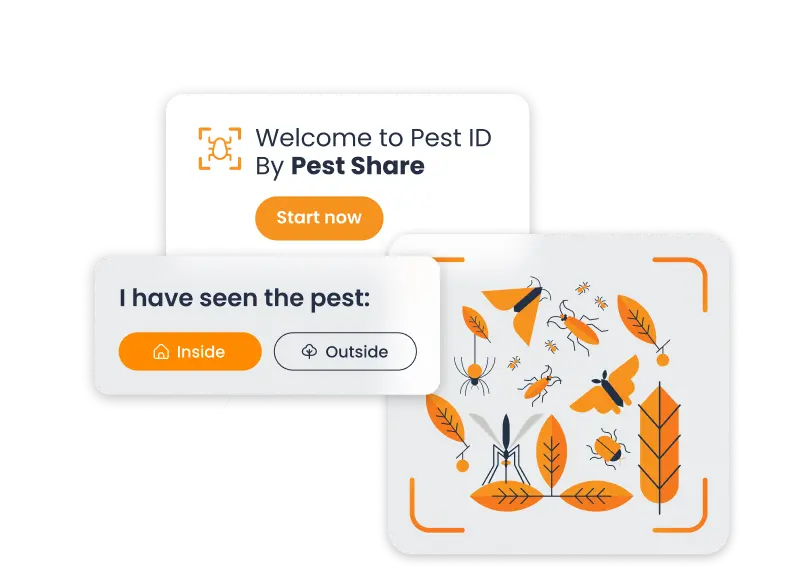Property managers know that maintaining a pest-free environment is crucial not only for tenant satisfaction but also for staying on the right side of the law. In this detailed guide, we will delve into common pitfalls and oversights that can have serious legal repercussions. This guide is designed to help you navigate the complex landscape of regulations and best practices, ensuring your property remains compliant and safe for all occupants. Whether you’re new to property management or a seasoned professional, these insights will prove invaluable in your efforts to effectively manage pest control while avoiding costly legal issues.

Fast Fixes. Happy Residents.
Failure to Identify the Pest Accurately:
Misidentifying the pest you’re dealing with can lead to using inappropriate control methods or chemicals, which might violate regulations and harm non-target species.
Skipping Pest Inspection:
Neglecting a proper inspection of your property can result in undetected infestations and the delayed implementation of control measures, potentially allowing the problem to worsen.
Using Banned or Restricted Pesticides:
Using pesticides that are banned or restricted in your area can lead to serious legal consequences, as these chemicals are often harmful to humans, wildlife, or the environment.
Mishandling Pesticides:
Improper storage, mixing, or application of pesticides can not only be ineffective but can also lead to environmental contamination and legal troubles.
Neglecting to Read Pesticide Labels:
Pesticide labels contain vital information about proper usage, safety precautions, and legal guidelines. Ignoring them can lead to violations and accidents.
Applying Pesticides in Unauthorized Areas:
Using pesticides in areas not approved by local authorities, such as near water sources or public spaces, can result in legal penalties and environmental harm.
Disposing of Pesticide Containers Incorrectly:
Improper disposal of pesticide containers can lead to soil and water contamination, violating environmental laws.
Failing to Document Pest Control Activities:
Accurate record-keeping is crucial for compliance. Neglecting to document pest control activities can make it difficult to prove you followed the law.
Overusing Pesticides:
Excessive pesticide use not only wastes resources but can also harm non-target organisms and lead to legal problems.
Not Consulting with Professionals:
Trying to handle complex pest problems without expert guidance can lead to ineffective solutions and potential legal issues. Always seek professional advice when needed.
Failure to Notify Tenants or Neighbors:
If you’re responsible for pest control in multi-unit housing or shared spaces, neglecting to inform tenants or neighbors about upcoming pest control measures can lead to disputes and legal troubles.
Not Considering Non-Chemical Alternatives:
Failing to explore non-chemical pest control methods when appropriate can result in unnecessary chemical exposure and potential legal liabilities.
Mishandling Wildlife Pests:
Dealing with wildlife pests like raccoons or bats without the proper permits or expertise can violate wildlife protection laws and regulations.
Ignoring Local Regulations:
Different regions may have specific pest control regulations. Failing to adhere to these local laws can result in legal consequences.
Using Counterfeit or Unregistered Pesticides:
Using counterfeit or unregistered pesticides can be illegal and may not effectively control pests, potentially causing further issues.
Misusing Pest Control Equipment:
Improper use or maintenance of pest control equipment, such as sprayers or traps, can lead to accidents and legal liabilities.
Not Providing Safety Training:
If you employ individuals to handle pesticides, failing to provide adequate safety training can lead to injuries and legal liabilities.
Incorrect Application Timing:
Applying pest control measures at the wrong time of year or under incorrect conditions can be ineffective and may violate local regulations.
Disregarding Endangered Species Protections:
Neglecting to consider protected species when conducting pest control, especially in ecologically sensitive areas, can lead to severe legal consequences.
Refusing Access for Pest Control Inspections:
If you’re required to allow pest control inspections, refusing access without a valid reason can result in legal issues and unresolved pest problems.
Using Homemade or Unapproved Remedies:
Attempting to create DIY pest control solutions without proper approval can lead to ineffective treatments and potential legal violations.
Neglecting to Secure Permits:
Certain pest control activities, especially for more significant infestations or in sensitive areas, may require permits. Failing to secure these permits can result in legal issues.
Not Maintaining Pest-Free Records:
If you’re in an industry where pest control records are necessary, such as food service or agriculture, failing to maintain accurate records can result in regulatory violations and fines.
Applying Pesticides Near Sensitive Areas:
Using pesticides near schools, hospitals, or other sensitive locations without proper precautions can lead to legal consequences and public health concerns.
Not Following Label Recommendations:
Pesticide labels provide specific guidelines for safe and effective use. Ignoring these recommendations can result in legal issues and poor pest control results.
Failure to Properly Dispose of Dead Pests:
Improperly disposing of dead pests, especially when dealing with regulated or invasive species, can lead to environmental violations.
Not Monitoring Pest Populations:
Regular monitoring is essential for effective pest control. Neglecting this step can result in pest resurgence and potential legal problems.
Misidentifying Beneficial Insects:
Killing beneficial insects inadvertently while attempting to control pests can disrupt the ecosystem and lead to legal issues in conservation areas.
Neglecting to Maintain Equipment:
Failing to maintain pest control equipment can lead to accidents, malfunctions, and potential legal liabilities.
Not Providing Proper Notification to Clients or Residents:
If you’re a pest control professional, failing to inform clients or residents about scheduled treatments can lead to complaints and legal disputes.
Inadequate Pest Identification:
One of the fundamental pillars of successful pest control is correctly identifying the pest species. Mistakenly identifying a pest can lead to the use of ineffective control methods and, in some cases, the unintentional targeting of beneficial insects. For instance, confusing a harmless native bee species with a stinging wasp may result in unnecessary pesticide application, harming pollinators critical for agriculture and ecosystems. Moreover, misidentification can hinder regulatory compliance, as different pests may be subject to distinct control guidelines and regulations. To avoid legal repercussions and ensure efficient pest management, invest time in accurately identifying the pests you’re dealing with, possibly with the assistance of entomologists or experts if necessary.
Disregarding Integrated Pest Management (IPM):
Integrated Pest Management (IPM) is a holistic approach to pest control that emphasizes prevention, monitoring, and the use of multiple strategies, including non-chemical methods, before resorting to pesticides. Neglecting IPM principles can lead to overreliance on chemical treatments, which may be ecologically harmful and could violate local regulations. To stay on the right side of the law and protect the environment, prioritize IPM strategies by implementing practices like regular pest monitoring, habitat modification, and biological control.

Not Considering Pest Resistance:
Pests can develop resistance to pesticides over time when these chemicals are used consistently and without variation. Failing to account for pest resistance can result in treatment inefficacy, increased pesticide usage, and potential legal troubles if resistant pests proliferate. To mitigate this risk, rotate pesticides, use alternative control methods, and stay informed about pest resistance developments in your area.
Ignoring Worker Safety:
If you employ individuals for pest control activities, neglecting their safety can lead to workplace accidents, injuries, and legal liabilities. Ensuring that workers receive proper training on pesticide handling, personal protective equipment use, and emergency response protocols is crucial for compliance with occupational safety laws and regulations. Prioritizing worker safety not only reduces legal risks but also fosters a responsible and ethical approach to pest control.
Exceeding Recommended Pesticide Application Rates:
Applying pesticides at higher rates than recommended on the product label can result in environmental contamination, harm to non-target organisms, and violations of pesticide use regulations. It is essential to meticulously follow the label instructions, including dosage, timing, and application methods, to ensure legal compliance and effective pest control.
Neglecting Buffer Zones:
Buffer zones are designated areas around sensitive sites like water bodies or neighboring properties, where pesticide application may be restricted or prohibited. Ignoring buffer zone regulations can lead to legal issues, especially if pesticides inadvertently drift or runoff into these areas. Be aware of local buffer zone requirements and take necessary precautions during pesticide application to prevent legal violations.
Failure to Secure Necessary Insurance:
Operating without adequate liability insurance can leave you financially vulnerable in the event of accidents or adverse consequences related to pest control activities. Ensure you have appropriate insurance coverage to protect yourself and your business from potential legal liabilities.
Misjudging Pest Severity:
Underestimating the severity of a pest infestation can lead to delayed or inadequate control measures, allowing the problem to worsen and potentially violating regulations related to pest management timelines. Regular monitoring and accurate assessment of pest populations are essential to prevent legal troubles and minimize pest-related damages.
Neglecting Pest Control Licensing:
Many regions require pest control professionals to obtain specific licenses or certifications. Operating without the necessary licenses can result in legal penalties and the inability to provide services legally. Ensure your qualifications align with local requirements to maintain a compliant and legal pest control business.
Failing to Educate Clients or Residents:
If you’re a pest control service provider, not adequately educating your clients or residents about the treatments, safety precautions, and post-treatment measures can lead to misunderstandings and potential legal disputes. Clear communication and transparency regarding pest control procedures are vital to building trust and avoiding legal complications.
Neglecting Environmental Impact Assessment:
Failing to conduct an environmental impact assessment before implementing pest control measures can result in unforeseen ecological consequences and legal troubles. These assessments help determine the potential harm to non-target species, water sources, and the overall ecosystem. By disregarding this crucial step, you risk violating environmental protection laws and may be held accountable for ecological damage. Always prioritize a comprehensive impact assessment as part of your pest control planning to ensure both legal compliance and responsible environmental stewardship.
Improper Pest Exclusion Practices:
Pest exclusion involves sealing entry points to prevent pests from entering a building or area. If done incorrectly, it can lead to structural damage, ineffective pest control, and potential legal disputes. Proper exclusion techniques require an understanding of building codes, material compatibility, and pest behavior. Neglecting these aspects may result in property damage claims and legal repercussions.
Not Obtaining Informed Consent:
In some situations, you may need to gain informed consent from property owners or residents before implementing pest control measures. Failing to do so can infringe on their rights, breach privacy regulations, and lead to legal action. Ensure you have the necessary permissions and that individuals are informed about the nature of the treatments and potential risks to make informed decisions.
Mishandling Pest Control Residues:
Improper disposal of pest control residues, such as dead pests or contaminated materials, can have legal and environmental ramifications. Disposing of these materials in a manner that violates waste disposal regulations can lead to fines and environmental harm. Adhere to local waste disposal guidelines and ensure proper handling of pest control residues to avoid legal issues.
Neglecting Pest Control Contracts:
If you’re a pest control service provider, not abiding by the terms and conditions outlined in your contracts can result in breach of contract disputes and legal consequences. Ensure you fulfill your contractual obligations, including service schedules, pricing, and guarantees, to maintain a positive client-provider relationship and avoid legal disputes.
Disrupting Ecologically Sensitive Areas:
Engaging in pest control activities in ecologically sensitive areas, such as wetlands or protected habitats, without proper permits can result in severe legal consequences and ecological damage. Before implementing any pest control measures in such areas, seek guidance from environmental agencies, obtain necessary permits, and strictly adhere to ecological protection laws.
Ignoring Product Recall Notices:
Using pesticides or pest control products that have been recalled by regulatory authorities due to safety concerns can result in legal liabilities. Stay informed about product recalls and immediately discontinue the use of any recalled items to ensure compliance with safety regulations and avoid potential legal issues.
Inadequate Training of Pest Control Personnel:
Neglecting to provide thorough training to your pest control personnel can lead to errors, accidents, and legal liabilities. Properly trained employees are more likely to handle pesticides, equipment, and customers with care, reducing the risk of incidents and legal disputes. Invest in ongoing training and certification to ensure your team is well-prepared for their responsibilities.
Using Unregistered Pest Control Products:
Using pest control products that are not registered with the appropriate regulatory authorities can lead to legal violations. Ensure that all the products you use are approved and registered for their intended purpose to avoid regulatory penalties and potential harm to the environment.
Neglecting to Inform About Reentry Periods:
After pesticide application, there is often a reentry period during which individuals should not enter the treated area. Failing to inform clients, residents, or workers about these reentry periods can result in exposure to harmful chemicals and potential legal claims. Clearly communicate reentry restrictions to prevent accidents and legal disputes.
Mishandling Pest-Infested Materials:
Improper disposal or handling of materials infested with pests, such as contaminated food or goods, can lead to health hazards, pest reintroduction, and legal complications. Ensure that you follow guidelines for safe disposal and sanitation to prevent the spread of pests and potential legal liabilities.
Lack of Collaboration with Neighbors:
In shared spaces or multi-unit housing, neglecting to collaborate with neighbors on pest control efforts can result in ongoing infestations and disputes. Failure to work together to address pest issues may lead to legal conflicts and strained relationships. Establish open communication and cooperation with neighbors to effectively manage pests and maintain a harmonious living environment.
Failure to Report Notifiable Pests:
Certain pests are categorized as notifiable or reportable to local authorities due to their potential harm to agriculture, public health, or the environment. Neglecting to report the presence of notifiable pests can result in legal consequences, as timely reporting is crucial for swift control measures and containment. Familiarize yourself with local notifiable pest lists and promptly report any sightings to comply with legal obligations.
Inaccurate Pest Control Advertising:
Misleading or false advertising related to pest control services can lead to legal actions, fines, and damage to your reputation. Ensure that your advertising materials accurately represent your services, pricing, and guarantees to maintain trust with clients and adhere to advertising regulations.
Failing to Stay Informed About Changing Regulations:
Pest control regulations can evolve over time, with new laws and guidelines constantly emerging. Failing to stay informed about these changes can result in unintentional legal violations. Dedicate time to regularly review and adapt your pest control practices to align with current regulations, ensuring that you remain compliant and avoid legal trouble.
In conclusion, pest control is a complex field with numerous potential pitfalls that can lead to legal trouble if not navigated carefully. By being aware of these 55 common pest control mistakes and taking proactive steps to address and prevent them, you can ensure that your pest management practices remain within the bounds of the law while effectively protecting your property, business, and the environment.





